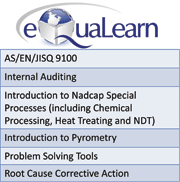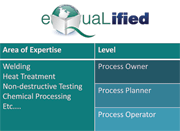E-Archive
Nadcap Column
in Vol. 11 - January Issue - Year 2010
Future-Proof Your Business


Albert Einstein once said “I never think of the future. It comes soon enough.” But in these troubled times, many of us cannot help but reflect on the future and what it may hold. Despite the difficulties of the recent months, there is reason to look forward with optimism. The Performance Review Institute (PRI) certainly thinks so: through its Customer Solutions & Support (CS&S) programs, PRI interacts with many companies of different sizes all over the world.
PRI has found that the aerospace industry has proved to be robust and strong; consequently, it has not suffered as badly as some sectors. Indeed, many companies with experience in other engineering disciplines are investigating routes into aerospace, attracted by this increased security. Existing aerospace manufacturers will need to work harder towards continual operational improvement in order to remain competitive. The increased interest in being part of the supply chain will benefit the aerospace industry as a whole, because it means that the crème de la crème can be identified and integrated into the existing systems.
It is important not to be complacent though: the aerospace industry still faces significant challenges. Ensuring continuity of skilled workforce availability and the transfer of knowledge from generation to generation and across the world is one of the biggest challenges in safeguarding the future of the industry. After all, without the right people with the right training in the right jobs at the right time, products cannot be manufactured.
One approach to this is talent management. Talent management describes the identification and development of staff. But how do you implement an effective talent management strategy?
Identify Your Business Needs
There are many talented individuals out there. But are they right for the business, now and in the future? This is a key question, or organizations may find themselves with redundant talent.
Many aerospace organizations have identified a need to develop their quality and special process personnel. PRI has worked with industry experts to create eQuaLearn, which provides general quality training; and eQuaLified which trains and certifies personnel to globally recognized industry standards.
Recognize High Potential Employees, and Reconcile Them to Business Needs
Top talent can be identified through their performance and personality. How well they perform their job role, how readily they have accepted other responsibilities – and their ability to carry them out, and their character will give a good indication of their potential and ambition. Involve all business leaders in the search for high potential employees – after all, they all have an interest in the success of the organization so give them some accountability for it as well.
Understand Their Motivation
To attract and retain high potential employees, it is important to know what motivates them. Money is the obvious answer, but for top talent, it is not enough. They also want to be challenged in their work and have job satisfaction. Career progression and professional development opportunities such as eQuaLearn and eQuaLified, are also important to top talent. Investing in people is now recognized as a vital way to make them feel valued, while simultaneously supporting business objectives and continually improving efficiency and creativity.
A contemporary of Einstein, the French philosopher Pierre Teilhard de Chardin said: “The future belongs to those who give the next generation reason for hope.” Despite the problems in the global economy today, there is reason to hope. Get involved, and the future is yours.
eQuaLearn and eQuaLified are part of PRI’s Customer Solutions & Support (CS&S), which exists to provide quality customer-driven and cost-effective business solutions to continually improve organizations throughout the world. Learn more at www.pri-network.org



























